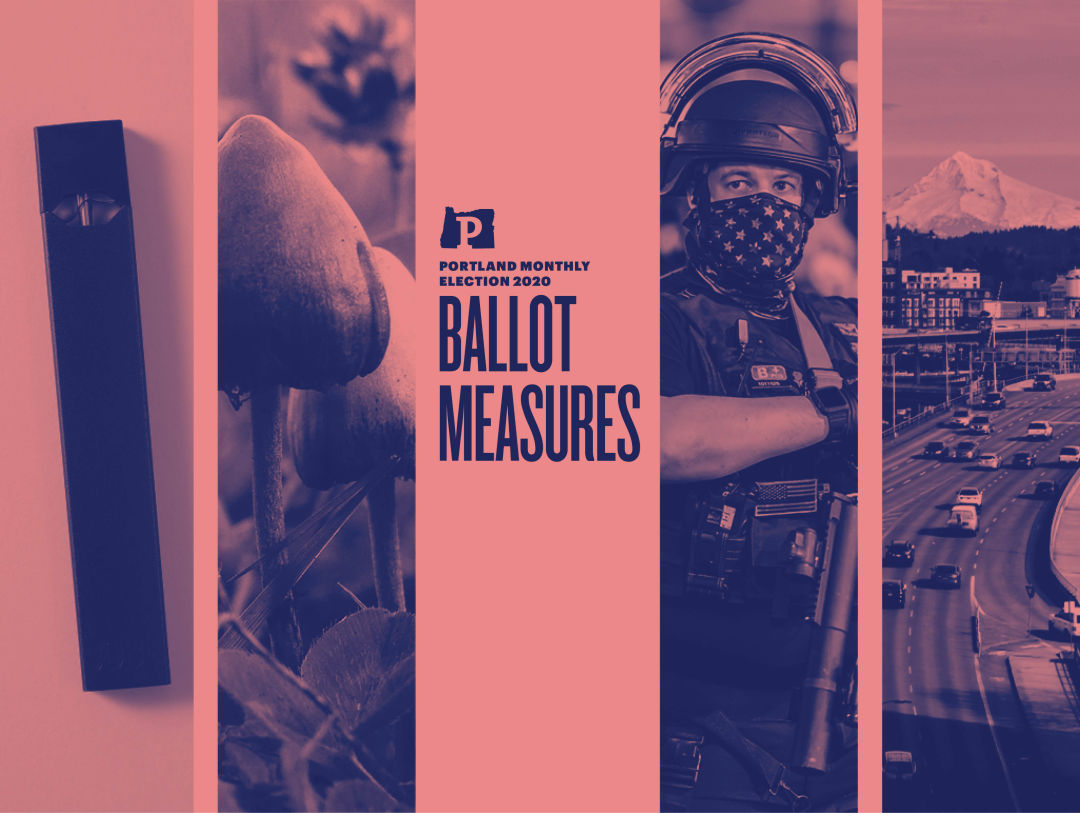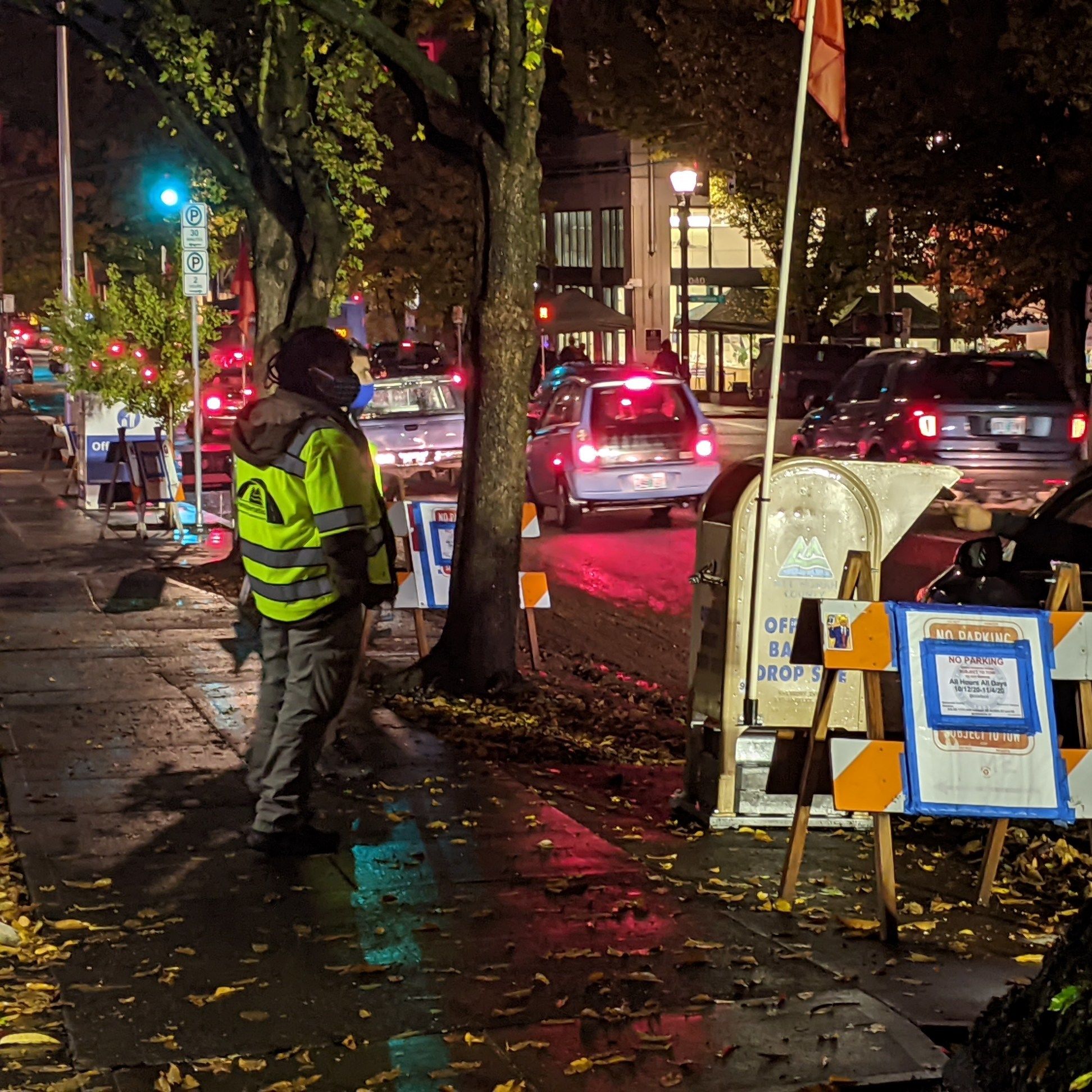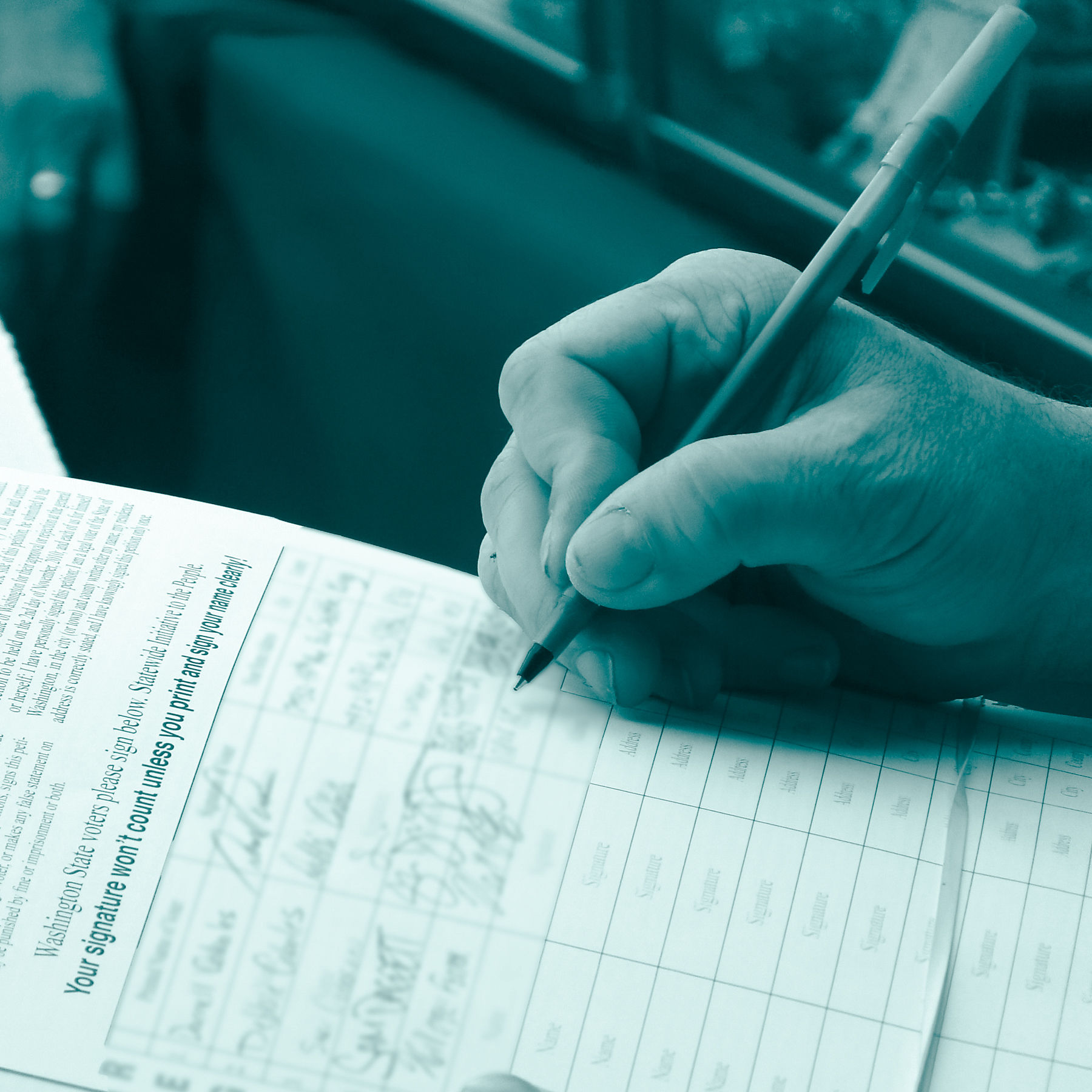LIVE: Oregon Ballot Measure Results

Image: Brian Breneman
| Multnomah County Ballot Measures | Yes | No |
|---|---|---|
| Measure 26-211 - Library bond | 59.72% | 40.28% |
| Measure 26-213 - Recreation and Parks Levy | 65% | 35% |
| Measure 26-214 - Tuition-Free Preschool Program | 64.14% | 35.86% |
| Measure 26-215 - PPS school renovation bond | 75% | 25% |
| Measure 26-217 - Police Oversight Board | 81.71% | 18.29% |
| Measure 26-218 - Payroll Tax for Infrastructure/Transpo | 43.22% | 56.78% |
| Measure 26-219 - Water Fund | 47.83% | 52.17% |
| Oregon Ballot Measures | Yes | No |
|---|---|---|
| Measure 107 - Campaign contribution limits/disclosures | 79.23% | 20.77% |
| Measure 108 - Cigarette tax increase | 67.60% | 32.40% |
| Measure 109 - Psilocybin mushroom program | 56.21% | 43.79% |
| Measure 110 - Drug decriminalization | 59.10% | 40.90% |
The presidential race isn't the only consequential choice Oregonians are making this election season. Though this year's slate is less chock-full of ballot measures than it usually is (thanks for that, pandemic), there's still plenty of important topics that await results on Tuesday night, from taxes to support schools, libraries, parks and preschool in Multnomah County to statewide consideration of tobacco taxes, campaign finance reform and drug decriminalization.
City of Portland/Metro Ballot Measures
Measure 26-218: Infrastructure and Transportation Payroll Tax
Measure 26-218 asks voters to decide on a proposed payroll tax, capped at 0.75 percent, on employers with 26 or more employees to fund a host of infrastructure projects and transportation programs. These include a light rail transit line to Tualatin, a new bridge over the Clackamas river in Gladstone, converting buses to run on electricity, street lights, free bus and MAX fares for school-aged young people, and more. Supporters include a host of nonprofits representing communities of color and others with an environmental focus, pointing to a need to build our transportation system “on a foundation of social equity.” Opponents, who have raised over $1.3 million and include Nike, Cambia Health Solutions, and various chambers of commerce, say the tax would be expensive and could displace some communities through the construction of proposed projects.
UPDATE (8:08pm): With close to 700,000 votes counted, those against the measure took an early lead securing 28.3 percent of the vote against 22 percent for supporters.
Measure 26-217: Police Oversight Board
Multnomah County Ballot Measures
Measure 26-211: Multnomah County Library Bond
Libraries are popular in Multnomah County. In fact, we have the fourth busiest library system in the country but drag in overall library square footage at 102nd. Our libraries are so busy that they regularly have to turn away children from reading programs due to lack of space. Measure 26-211’s $387 million library bond seeks funding to increase space for children’s reading programs in addition to creating facilities for librarians to help job seekers with resume writing and interview preparation, plus provide free high-speed internet at all branches. It will also make expansions to branches in Albina, Midland, Belmont, Holgate, North Portland, Northwest, and St. Johns libraries—some that haven’t ever been updated despite buildings that date back a century. It will also fund building a new flagship library in Gresham in East Multnomah County where the area has 40 percent of the county’s population but just 20 percent of the library space.
If approved, property owners will see an increase in their property taxes. The average addition is 61 cents per $1,000 in assessed property value for eight years with the median property owner expected to pay $120 per year ($10/mo) to fund the bond.
Update: 8:38pm
Early results show the library bond will pass with 60% of the 340,000 votes counted.
Measure 26-213: Portland Parks Levy
The pandemic made one thing abundantly clear: not only do Portlanders love their parks, they desperately need them. But for years Portland Parks & Rec has had budget issues and in 2019 made big cuts to programs and community resources. Then came COVID, forcing the closure of community centers, pools, and programs and adding to the growing deficit. The five-year levy would add more recreation offerings including art and fitness class, environmental education, and youth and senior programs. It would also make those offerings more equitable by expanding the free opportunities for communities of color, refugees and immigrants, and low-income households. And of course, there is the parks element to the park bond— PP&R says they will also use the additional $48 million per year to care for the 8,000 acres of natural area around the city.
If approved property owners will see an increase in their property taxes. The levy is 80 cents per $1,000 in assessed property value for five years with the median property owner expected to pay $151 per year ($13/mo) to fund it.
Update: 8:38pm
The five-year levy looks set to pass with 65% of the 315,000 votes counted.
Measure 26-214: Tuition-Free Preschool
Measure 26-215: Portland Public Schools Bond
Also on the ballot, a proposed $1.2 billion schools bond measure. The massive proposal would continue the district's work on remaking its high schools, including a full renovation of Jefferson High School in North Portland, and finishing ongoing construction at Benson Polytechnic High School in Northeast Portland. The bond also looks ahead to the final phase of the district's high school work with $40 million earmarked for planning and design work on eventual construction at Wilson High School in Southwest Portland and Cleveland High School in Southeast Portland. A new addition to the bond proposal, finalized after this summer's racial reckoning throughout Portland, is a $60 million set aside for a Center for Black Student Excellence, which would be located in North Portland.
If approved, the proposal would continue the current tax rate, which voters first passed in 2012 and then re-upped in 2017. And it's likely to reappear on ballots in 2024, for the final phase of high school construction.
Update 8:37pm
Within minutes of polls closing results show the bond appears to pass with 75% of the 273,000 votes counted.
Statewide Ballot Measures
Two of the statewide measures on the ballot come to us courtesy of the Oregon legislature, which referred them to voters.
Measure 107: Amend Campaign Finance
Oregon has long been known for having one of the nation’s least restrictive rules on campaign financing, because state courts have found that political donations are a form of protected speech. It looks like that is poised to change, since as early returns came in on Tuesday, 81 percent of voters were in favor of those limitations, with about 1.2 million votes in so far. The change would allow state and local governments to limit campaign contributions and expenditures made by individual donors. Future candidates would also be required to be more explicit about their donors, and the source of funding for TV, radio and social media ads. But don’t expect anything to change right away: this measure amends the state constitution to allow local governments and the state legislature to put new rules in place—it doesn't enforce a whole new set of rules right off the bat. It’s up to elected officials to take it from there.
UPDATE: Measure 107 passed with overwhelming support, with 76 percent of voters in favor of it, with more than 1.8 million votes tallied.
Measure 108: Tobacco and Nicotine Tax
Your smoking habit looks like it is going to get much more expensive, given that it is looking like Oregonians are approving Measure 108. With more than 1.3 million votes in, the measure was passing with 70.3 percent of voters in favor. Under the measure, it would cost another $2 to buy a pack of cigarettes in Oregon, after a surprisingly muted campaign to raise the tax on tobacco statewide. There wouldalso be stiff new taxes imposed on the e-cigarette market, with any and all new revenue going to the Oregon Health Authority and the Oregon Health Plan for medical and addiction treatment programs. (If people quit because of the higher prices, there’s less money coming in, but fewer smokers—potato, pohtahto?). The concept drew very minimal organized opposition, especially when compared to 2007, the last time there was a tobacco tax on the ballot in Oregon. Back then, the tobacco lobby spent millions in an ultimately successful campaign to defeat the proposed tax.
The other two statewide ballot measures are about drugs. Oh Oregon—never change.
UPDATE: Measure 108 passed handily, with 66.6 percent of Oregon voters supporting the plan, or nearly 1.28 million voters, as of 9:15 pm on Tuesday night.
Measure 109: Legalize Psilocybin
If passed, measure 109, the Psilocybin Program Initiative, would authorize the Oregon Health Authority to create a program to permit licensed service providers to administer psilocybin-producing mushroom and fungi products to individuals 21 or older. A “yes” vote would allow manufacturing, delivery, administration of psilocybin at supervised, licensed facilities; impose a two-year development period; and create an enforcement and taxation system, advisory board, and administration fun. A “no” vote would essentially keep things as is, prohibiting the manufacture, delivery, or possession of psilocybin, with misdemeanor or felony criminal penalties.
There’s been overwhelming support for this measure, from the Heroic Hearts Project to the ACLU. Of course, not everybody is on board, namely the Oregon Psychiatric Physicians Association and the American Psychiatric Association.
Update 8:20pm: Early results indicate that Oregon will is set pass a measure to allow psilocybin-assisted therapy, with 59.25 percent of Oregonians voting "yes" on measure 109.
Measure 110: Addiction Recovery Centers
If passed, measure 110, the Drug Decriminalization and Addiction Treatment Initiative, would decriminalize the personal possession of small (teeny) amounts of controlled substances in Schedule I-IV, such as heroin, cocaine, and methamphetamines. It also reduces the penalties for possessing larger amounts and would reclassify certain illicit drugs from a Class A misdemeanor to a Class E violation resulting in a $100 fine or a completed health assessment. A “yes” vote would provide addiction recover centers/services funded in part by the state's marijuana tax revenue and state prison savings. A “no” vote would reject requiring addiction recovery centers/services, retain current marijuana tax revenue uses, and maintain current drug classifications and penalties.
Proponents say measure 110 would lead to a reduction in racial disparities for possession of controlled substances in the state and treat addiction as a mental health issue. Opponents argue the measure goes too far in its attempt to decriminalize certain drugs and will not help those who suffer in active addiction.
Update 8:21pm: Oregon is poised to become first state in the country to decriminalize personal drug possession, as results from Measure 110 come in just minutes after polls in Oregon have closed. More than 60 percent of Oregonians have voted in favor of Measure 110.












